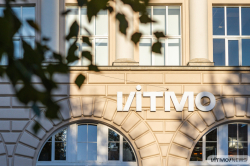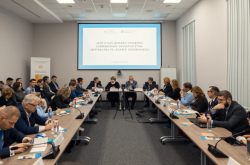Nowadays, many universities are trying to answer the question of how to effectively integrate AI into the educational process. While some are experimenting, others are already implementing their own standards on the use of neural networks. At the same time, there seem to be varying opinions on the role of AI and its influence, be it positive or negative. And the first debate to be had by both university representatives and future employers is this: will AI damage the value of deep fundamental education?
AI comes to universities: changes to expect
Evgeny Sokolov, the head of School of Big Data and Information Retrieval at HSE University, believes that there are two major issues here: on the one hand, the number of researchers in academia keeps getting smaller because young people prefer to get a job as early as possible to start making money. On the other hand, with the rise of AI technologies university applicants start having doubts about the need for deep fundamental education: neural networks provide countless opportunities and are already capable of performing quite complex tasks.
“We need researchers, as well as developers of new technologies. First, starting from their first year, we need to engage Bachelor’s students in research and make research more attractive. Second, we have to think of ways to combine the two worlds: academic and industrial. Students can be engaged in research and be employed at a company, contributing to business. We need a new format to merge these two universes – and we are looking for it,” shared Mr. Sokolov.

Evgeny Sokolov. Photo by Sergey Kulakov / Roscongress Photo Bank
Anna Lemyakina, the director for national and strategic projects at Yandex.Cloud, has also noted the trend toward interdisciplinarity:
“Any threat is also an opportunity. I would like to point out the tendency for collaboration between business and science – they don’t have to contradict each other. We need to expand the variety of opportunities offered to modern scientists using AI not only in IT, but also in social sciences, humanities, medicine, biology, ecology, and other fields.”
The deputy dean of ITMO’s Information Technologies and Programming Faculty, Alexander Mayatin, talked about the problem of fundamental expertise in terms of pedagogy. AI is a new tool that has given us the opportunity to delegate decision-making to a technology. As long as these models aren’t perfect, fundamental expertise remains valuable. However, with the advance of AI there is a risk of losing interest in getting to know a professional field intimately.

The discussion on education for AI natives at the Congress of Young Scientists. Photo by Sergey Kulakov / Roscongress Photo Bank
“Everything starts with educators. They are responsible for demonstrating the value of fundamental academic knowledge to their students – and this is the system that has to become the foundation of transformation in university education. When lecturers focus only on practicing their knowledge, they stop growing because there just aren’t such tasks in the industry. In comes AI – it can write lectures and even make tests for students. As soon as lecturers start using these tools themselves, it becomes hard for them to maintain the requirements they set for students. How can we prevent that? That’s a challenge that we have to work on today,” said Alexander Mayatin.
Daria Kozlova, ITMO’s Director for Strategic Development and director for education at Yandex, believes in a positive outcome: she considers the use of AI by both educators and students as a fact – which now needs to be followed by positive consequences.
“If these days everyone is ready to generate questions and answers, we have to build educational technology differently and change its contents. For instance, since its foundation, ITMO’s School of Physics and Engineering has adhered to the practice of open-book exams, where students can use any materials they want. This is what’s happening now, only these days we’ve learned to give prompts. This is just the next step,” concluded Daria Kozlova.

Daria Kozlova. Photo by Sergey Kulakov / Roscongress Photo Bank
AI for students and educators: potential threats
According to Igor Remorenko, the Rector of Moscow City University, universities are very flexible structures that will be able to adapt to the new conditions just as they did with the advance of computers and the internet. At the same time, AI has to remain in the position of an assistant, not an independent creative unit.
“Universities are constantly changing, keeping an eye out for what’s going on around them. I can’t wait for Yandex GPT or GigaChat to come out with a service for universities, where we’d be able to create our own communicators – for instance, we already have Ushinsky and Vygotsky. This will happen and the system will manage because there will always be knowledge that’s inaccessible for the majority of students outside of interaction with lecturers. AI won’t provide the full amount of knowledge,” added Igor Remorenko.

Igor Remorenko. Photo by Sergey Kulakov / Roscongress Photo Bank
The notion of AI “temptations” in education was introduced into the discussion by Pavel Sergomanov, the head of the SberObrazovanie (SberEducation) academic laboratory:
“Any educational process is aimed at ourselves; however, when we are using AI, we aren’t really working on ourselves or changing. I believe that ‘AI native’ education should be just that – education that helps us overcome the temptations of AI.”
Another task of education for AI natives is in the creation of such practical and project tasks that will make students actively think. However, for now, neural networks nudge us towards a practical, rather than academic, path.
Alexander Mayatin suggested a solution to this problem: he believes that to ensure high-quality education, both sides – the student and the lecturer – have to jointly use AI for education; then, they will both grow and develop.

Alexander Mayatin. Photo by Sergey Kulakov / Roscongress Photo Bank
Achieving results
Fairly recently, we’ve witnessed the peak of short-term courses in narrow specializations. Daria Kozlova believes that this trend has come to an end. These days, many start to realize that solving major cases from employers is impossible without fundamental knowledge.
“In this case, the responsibility lies not only on universities, but also on businesses. We have to broadcast the opinion that research is also a job, one that’s in-demand and well-paid,” pointed out Dr. Kozlova.
For education to yield the best results, businesses and universities have to consolidate their efforts: some participants of this system – researchers at universities – know how to conduct research, while others – businesspeople – know how to monetize its results. Any research these days is a job. So, believes Pavel Sergomanov, students actually start working while still at university, and, at the same time, corporations now offer tools and methods for learning.

The discussion on education for AI natives at the Congress of Young Scientists. Photo by Sergey Kulakov / Roscongress Photo Bank
AI era: training vs education
Alexander Mayatin regards professional training as important but believes that no lesser impact has to be made on upbringing and personal development. This will be a constructive answer to the challenges of the AI native era in education. Universities remain a flexible environment for communication, so results will follow as long as lecturers and students learn to use these new tools together.
Education is about those people who will be developing a new technological world where they will be active participants. Here, Daria Kozlova considers mathematics a crucial subject in the matter – she believes that it will help students understand the world of AI. Knowing how to write prompts comes second in this case. And building this complex mathematical foundation is a mission for universities and business.
Concluding their discussion, the experts settled on the following objectives: being open to experiments, striving for a merger between science and business, using the capabilities of AI, contributing resources to the collaborative development of lecturers and students, and preserving the value of fundamental education.

The discussion on education for AI natives at the Congress of Young Scientists. Photo by Sergey Kulakov / Roscongress Photo Bank
The fourth Congress of Young Scientists is being held at Sirius University of Science and Technology on November 27-29. This year, the event has brought together over 7,000 participants from 40 countries, with the program featuring more than 170 business, cultural, and sports events. ITMO University is represented by:
- Vladimir Vasilyev, Rector;
- Daria Kozlova, Director for Strategic Development;
- Alexander Mayatin, deputy dean of Information Technologies and Programming Faculty;
- Alexander Vinogradov, head of ITMO’s Advanced Engineering School;
- Daria Denisova, head of Center for Science Communication;
- Konstantin Fursov, head for research at the Center for Science Communication.
Discover the full business program here.
The discussion on education for AI natives at the Congress of Young Scientists. Photo by Sergey Kulakov / Roscongress Photo Bank





